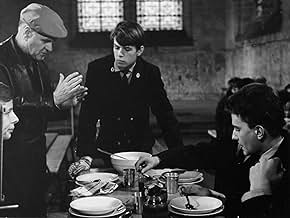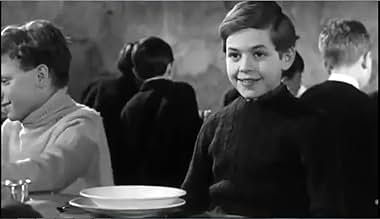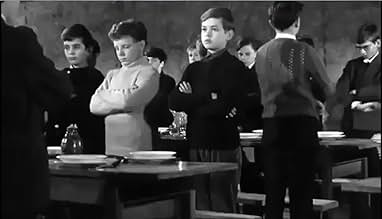ÉVALUATION IMDb
7,6/10
3,1 k
MA NOTE
Au pensionnat de jésuites, le jeune Alexandre tombe amoureux d'un nouvel arrivant (un plus grand). Les directeurs de conscience ont mis leurs garçons en garde contre 'les amitiés particulièr... Tout lireAu pensionnat de jésuites, le jeune Alexandre tombe amoureux d'un nouvel arrivant (un plus grand). Les directeurs de conscience ont mis leurs garçons en garde contre 'les amitiés particulières', pernicieuses ; l'amour est ici interdit même aux coeurs purs. [255]Au pensionnat de jésuites, le jeune Alexandre tombe amoureux d'un nouvel arrivant (un plus grand). Les directeurs de conscience ont mis leurs garçons en garde contre 'les amitiés particulières', pernicieuses ; l'amour est ici interdit même aux coeurs purs. [255]
- Prix
- 1 nomination au total
Gérard Chambre
- André Ferron
- (uncredited)
Henri Coutet
- L'employé de l'institution
- (uncredited)
Dominique Diamant
- Maurice Motier
- (uncredited)
Alain-Philippe Malagnac
- Un élève
- (uncredited)
Bernard Musson
- Le père enseignant
- (uncredited)
Colette Régis
- La religieuse
- (uncredited)
Histoire
Le saviez-vous
- AnecdotesIn the source novel, Georges de Sarre is 14 years old and Alexandre Motier is 12 years old. However, the year in which the film was made, Francis Lacombrade (1942-) was 22 years old and Didier Haudepin (1951-) was 13 years old.
- GaffesWhen Lucien looks at his watch we can see that the time is 6:15 but he reads it as 10:35.
Commentaire en vedette
This is the film adaptation of Roger Peyrefitte's novel telling the deeply moving love story of brilliant 16 year-old aristocrat Georges de Sarre and beautiful 12 year-old Alexandre Motier at St. Claude's, a French, Catholic boarding-school in the 1920s. Though chaste, their love is passionately expressed through poems, gazes and the odd kiss, and there is no mistaking the sensuality underpinning it.
Whether consummated or not, for many centuries such intense love affairs between younger and older boys were a feature of boarding-school life that brought joy and relief to some of the more feeling and less hung-up sort of adolescents, as well as grief and catastrophe to the minority whose liaisons were discovered and crushed by the Christian authorities. They were essentially pederastic, satisfying different emotional needs in the younger and older participants, though the disparity in age lent them special intensity for both.
This ancient tradition more or less died a generation or so ago; the boys who would once have partaken or at least have approved of romantic friendships nowadays either never see their appeal, brought up as they are in a society so antagonistic to them, or shun them through terror of being misunderstood and branded as gay. Indeed, the number of reviews of this film implying gayness is proof they are right to fear it is now practically impossible to escape being judged according to the new dogma insisting on a fixed sexual orientation for even early teens.
It is salutary to remember that however responsible the priests at St. Claude's were for the tragedy of Alexandre and Georges and however misguided the abhorrence of sin that drove them to act as they did, they acted as gentle lambs compared to the savagery with which their post-Christian successors today would crush an affair that any older and younger boy had the temerity to get embroiled in. Our new moral dictators would of course destroy Alexandre to save him from an unequal relationship rather than from the sin of homosexuality, but that would make no difference to either the cruel outcome or the monstrous bigotry behind it. Ironically it would actually increase the perverse injustice of such interference: Alexandre is typical of the younger boy in a special friendship in that his emotional need for it is evidently greater and so it is even more vital to his happiness than to Georges's that it should not be broken up.
Considering special friendships at boarding-school seem to have disappeared from our emotional landscape and are now so badly misunderstood, we must be forever thankful that in the short space of time when they were still fairly widely understood and it had also become possible to write candidly about such delicate matters, not only did such a talented writer as Peyrefitte preserve their character for us so evocatively, but that a film was made of it before the moral panic about teenage sexuality which arose in the 80s made such an undertaking unthinkable.
Unsurprisingly, the film is not as outstanding as the novel, though mostly faithful to it. The most significant change is that, in the novel, Georges was only fourteen, but as he seemed a little improbably sophisticated for even a French patrician of that age, this was actually an improvement. The problem with the adaptation to film is largely the common one of condensation. Because we do not get to know the protagonists quite so well, it is harder to be so deeply moved by their plight. Mostly gone too is the richly elaborated conflict in the boys' minds between the influences of puritanical Christian doctrine and the boy-admiring Graeco-Roman attitudes it drove into hiding. Nevertheless, the film is well acted, atmospheric and near the end soars towards the heights of aching pathos achieved in the novel.
Peyrefitte was much involved in the making of the adaptation to film, which makes for a fascinating footnote: he was rewarded by meeting on the set the love of his life, 12-year-old Alain-Philippe Malagnac, who had a minor role in the film as a choirboy and introduced himself to the author as a fan of the novel, a story Peyrefitte recounted in Notre amour (1967).
Edmund Marlowe, author of Alexander's Choice, an Eton love story, www.amazon.com/dp/1481222112
Whether consummated or not, for many centuries such intense love affairs between younger and older boys were a feature of boarding-school life that brought joy and relief to some of the more feeling and less hung-up sort of adolescents, as well as grief and catastrophe to the minority whose liaisons were discovered and crushed by the Christian authorities. They were essentially pederastic, satisfying different emotional needs in the younger and older participants, though the disparity in age lent them special intensity for both.
This ancient tradition more or less died a generation or so ago; the boys who would once have partaken or at least have approved of romantic friendships nowadays either never see their appeal, brought up as they are in a society so antagonistic to them, or shun them through terror of being misunderstood and branded as gay. Indeed, the number of reviews of this film implying gayness is proof they are right to fear it is now practically impossible to escape being judged according to the new dogma insisting on a fixed sexual orientation for even early teens.
It is salutary to remember that however responsible the priests at St. Claude's were for the tragedy of Alexandre and Georges and however misguided the abhorrence of sin that drove them to act as they did, they acted as gentle lambs compared to the savagery with which their post-Christian successors today would crush an affair that any older and younger boy had the temerity to get embroiled in. Our new moral dictators would of course destroy Alexandre to save him from an unequal relationship rather than from the sin of homosexuality, but that would make no difference to either the cruel outcome or the monstrous bigotry behind it. Ironically it would actually increase the perverse injustice of such interference: Alexandre is typical of the younger boy in a special friendship in that his emotional need for it is evidently greater and so it is even more vital to his happiness than to Georges's that it should not be broken up.
Considering special friendships at boarding-school seem to have disappeared from our emotional landscape and are now so badly misunderstood, we must be forever thankful that in the short space of time when they were still fairly widely understood and it had also become possible to write candidly about such delicate matters, not only did such a talented writer as Peyrefitte preserve their character for us so evocatively, but that a film was made of it before the moral panic about teenage sexuality which arose in the 80s made such an undertaking unthinkable.
Unsurprisingly, the film is not as outstanding as the novel, though mostly faithful to it. The most significant change is that, in the novel, Georges was only fourteen, but as he seemed a little improbably sophisticated for even a French patrician of that age, this was actually an improvement. The problem with the adaptation to film is largely the common one of condensation. Because we do not get to know the protagonists quite so well, it is harder to be so deeply moved by their plight. Mostly gone too is the richly elaborated conflict in the boys' minds between the influences of puritanical Christian doctrine and the boy-admiring Graeco-Roman attitudes it drove into hiding. Nevertheless, the film is well acted, atmospheric and near the end soars towards the heights of aching pathos achieved in the novel.
Peyrefitte was much involved in the making of the adaptation to film, which makes for a fascinating footnote: he was rewarded by meeting on the set the love of his life, 12-year-old Alain-Philippe Malagnac, who had a minor role in the film as a choirboy and introduced himself to the author as a fan of the novel, a story Peyrefitte recounted in Notre amour (1967).
Edmund Marlowe, author of Alexander's Choice, an Eton love story, www.amazon.com/dp/1481222112
- edmund-marlowe
- 28 janv. 2013
- Lien permanent
Meilleurs choix
Connectez-vous pour évaluer et surveiller les recommandations personnalisées
- How long is This Special Friendship?Propulsé par Alexa
Détails
- Date de sortie
- Pays d’origine
- Langue
- Aussi connu sous le nom de
- This Special Friendship
- Lieux de tournage
- Abbaye de Royaumont, Asnières-sur-Oise, Val d'Oise, France(jesuit college where the story takes place)
- sociétés de production
- Consultez plus de crédits d'entreprise sur IMDbPro
- Durée1 heure 40 minutes
- Couleur
- Mixage
- Rapport de forme
- 1.78 : 1
Contribuer à cette page
Suggérer une modification ou ajouter du contenu manquant

Lacune principale
By what name was Les amitiés particulières (1964) officially released in India in English?
Répondre




















